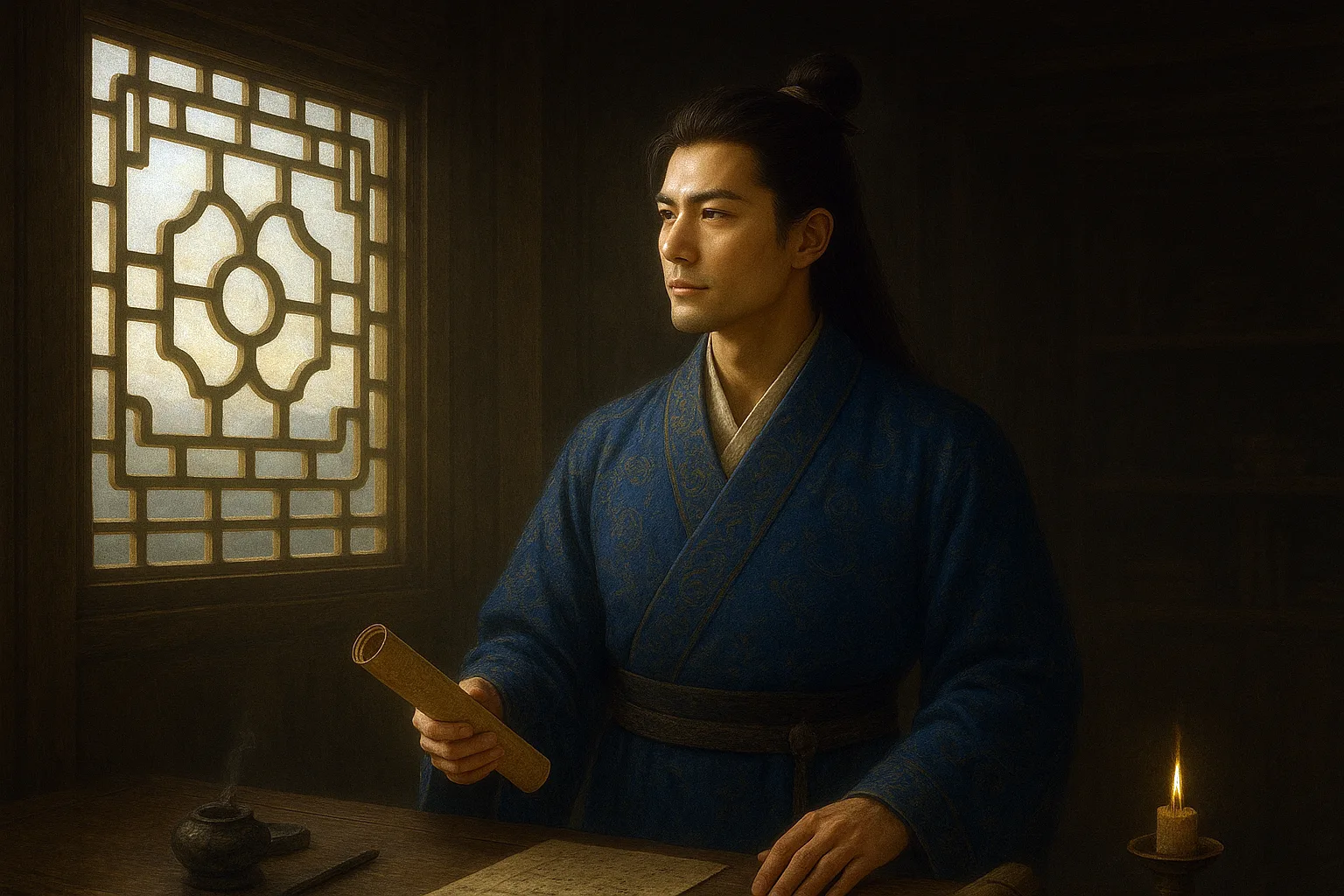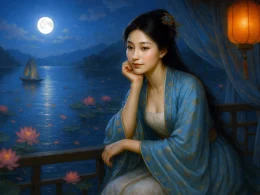The moss may hide the clear pool from the view;
The toad may bite the bright moon in the blue.
Buried and fallen as I am today,
Can I not clear your heart as mirror may?
I wish you would clean my dust away
And see your hair of gloss as dark as night!
Original Poem
「古镜」
沈佺期
莓苔翳清池,虾蟆蚀明月。
埋落今如此,照心未尝歇。
愿垂拂拭恩,为君鉴玄发。
Interpretation
This poem was composed during Shen Quanqi's period of exile to Huánzhou (in present-day northern Vietnam) after being implicated in the Zhang Yizhi affair. Removed from court and stripped of influence, the poet used the metaphor of an "ancient mirror" to express his feelings of being buried in obscurity yet maintaining his moral integrity and unwavering loyalty to the state. In classical tradition, the mirror symbolized self-reflection and clarity; here, Shen Quanqi merges the mirror's "brightness" with his own "aspiration," revealing a spirit that holds fast to ideals and remains true to its purpose even in adversity.
First Couplet: "莓苔翳清池,虾蟆蚀明月。"
Méi tái yì qīng chí, xiā má shí míng yuè.
Moss and lichen shroud the clear pond;
Toads gnaw at the bright moon’s reflection.
The opening couplet uses natural imagery to convey symbolic meaning. The mirror, long submerged in a pond, covered by moss, represents a virtuous talent obscured by circumstances and relegated to a lowly position. The bright moon’s reflection being eroded by toads symbolizes a dim and corrupted world where petty individuals prevail. Through these images, Shen Quanqi implicitly reflects on his own plight—his language is subtle, yet the conception is profound.
Second Couplet: "埋落今如此,照心未尝歇。"
Mái luò jīn rú cǐ, zhào xīn wèi cháng xiē.
Buried and neglected as it is today,
Its light to illuminate hearts has never ceased.
This couplet turns to self-metaphor. Although the ancient mirror is dusty and buried, its brightness remains undimmed; though the poet is exiled to a distant land, his resolve is unchanged. The phrase "illuminate the heart" embodies the poem’s core spirit—it signifies "loyalty." It symbolizes not only the poet’s confidence in his own unwavering virtue but also his commitment to remain pure and uncorrupted by the mundane world.
Third Couplet: "愿垂拂拭恩,为君鉴玄发。"
Yuàn chuí fú shì ēn, wèi jūn jiàn xuán fà.
I pray for the grace of being wiped clean,
To serve my lord and mirror his dark hair—and my own graying loyalty.
The concluding couplet ends with an earnest plea, expressing the hope for reinstatement. "Grace of being wiped clean" symbolizes the emperor’s favor in recalling and reappointing the poet; "mirror his dark hair" is a humble reference to his own aging, yet also implies an unchanging heart. Using the ancient mirror as a metaphor for himself, the poet hopes the ruler will "recognize true gold amidst the dust," allowing him to shine even in old age. The closing tone is sincere yet not obsequious, reflecting both a subject’s reverence and a scholar’s pride.
Holistic Appreciation
Though brief—only three couplets comprising fifteen characters—this poem possesses profound conception and exquisite craftsmanship. The poet uses the "ancient mirror" to symbolize the virtuous talent, "moss" and "toads" to represent obscuration by petty men, "illuminate the heart" to signify clarity and self-maintenance, and "grace of being wiped clean" to express the hope for recognition. In just a few lines, it captures both the form of a static object and the principles of human life, embodying the "somber yet luminous" characteristic of Shen Quanqi’s later poetry.
Each line carries dual meaning: it describes the mirror while also expressing the self; it reveals the pain of frustration yet contains an unyielding will. The language is plain and unadorned, yet the vision is lofty and the emotion genuine and deep. Compared to similar works that "use objects to convey aspirations," such as "Reflecting on Ancient Sites" or "Poems of Feeling," "The Ancient Mirror" appears more introspective and restrained, bearing a style akin to Du Shenyan’s "classical elegance" yet infused with its own solitary and sharp clarity.
Artistic Merits
- Using Objects to Convey Aspirations, Embedding Reason in Imagery: The mirror’s brightness and obscuration naturally symbolize the rise and fall of loyal ministers, with profound implications.
- Inspiring the Opening with Subtlety: The first couplet seems to describe scenery but implicitly conveys worldly realities, demonstrating skillful use of comparison and symbolism.
- Concise Language, Clear Conceptual Flow: The three couplets progress step-by-step, moving from setting to aspiration, and from aspiration to emotion.
- Genuine Emotion and Vigorous Spirit, Lofty Style: It contains the sorrow of being cast aside yet also the fortitude of unchanged loyalty—mournful but not wounded, with an inherent upright spirit.
Insights
This work conveys not only the poet’s lament for his personal fate but also a belief in the inextinguishable light of the spirit. Even if time buries it and moss covers its surface, true character and talent will still shine brightly. Through the metaphor of a static object, the poet reminds us: When in adversity, hold fast to your clarity; even if buried, never forget your original heart.
About the Poet

Shen Quanqi (沈佺期 c. 656–715), courtesy name Yunqing, was a native of Neihuang in Henan Province and an important poet of the early Tang Dynasty. Along with Song Zhiwen, he was renowned as one of the "Shen-Song" duo, whose work played a decisive role in finalizing the form of the five-character regulated verse (wuyan lüshi) in Tang poetry. His poems often include courtly compositions and travel-themed reflections, characterized by refined elegance and structural rigor. Shen was particularly skilled in the seven-character regulated verse (qilü), and his writing marks a transition from the lingering style of the Six Dynasties to the flourishing era of High Tang poetry. His contributions hold milestone significance in the development of modern-style verse (jintishi).












